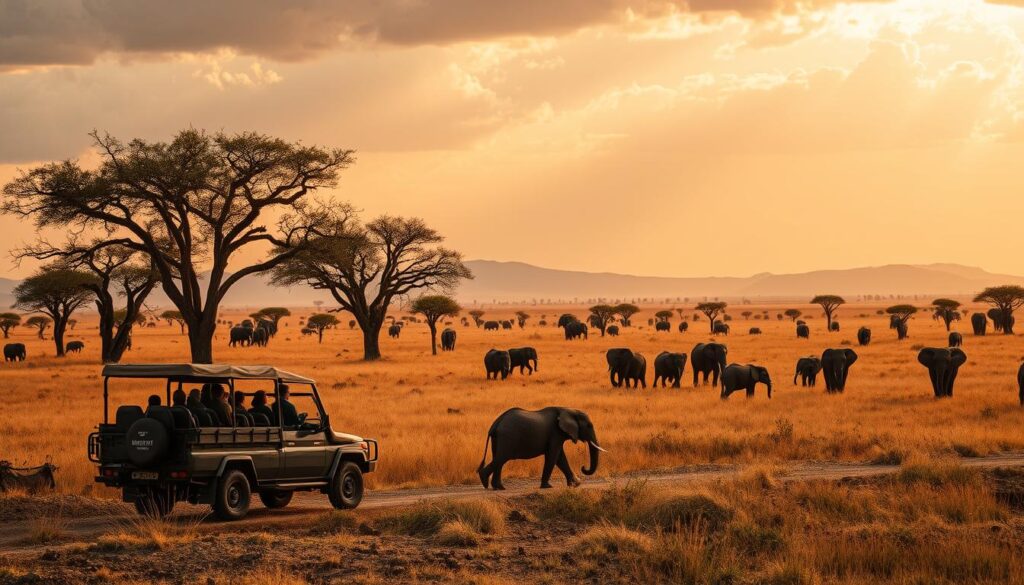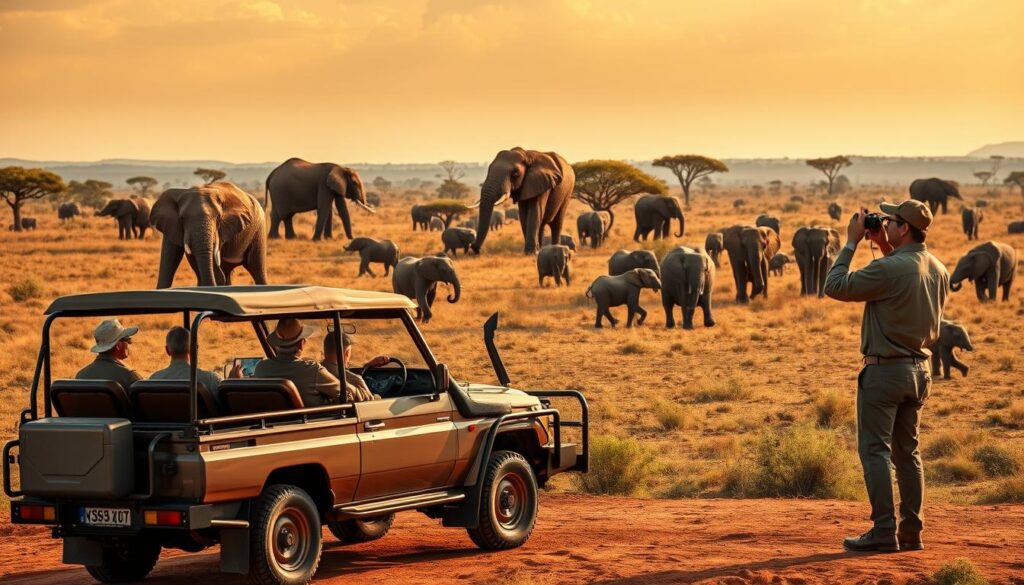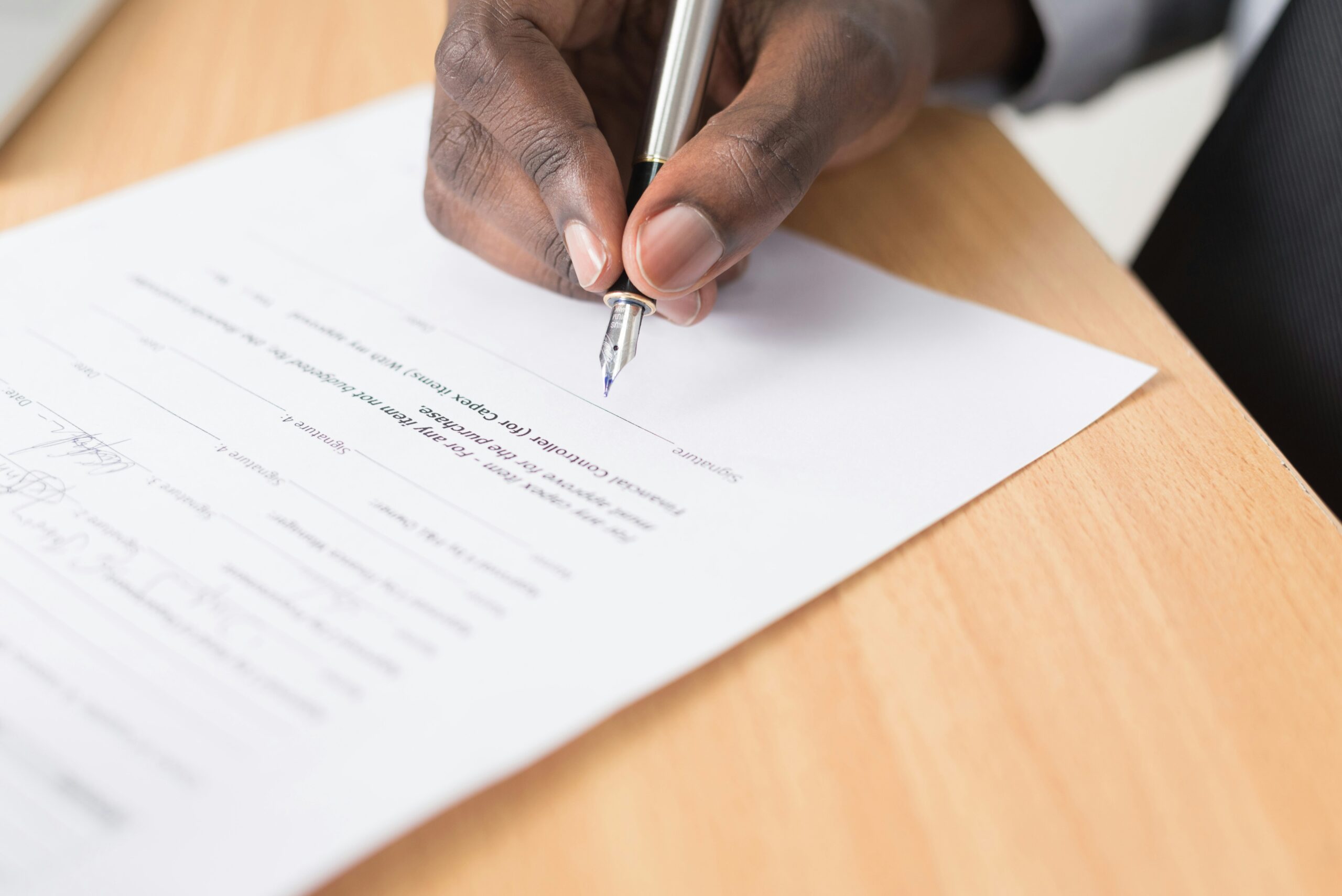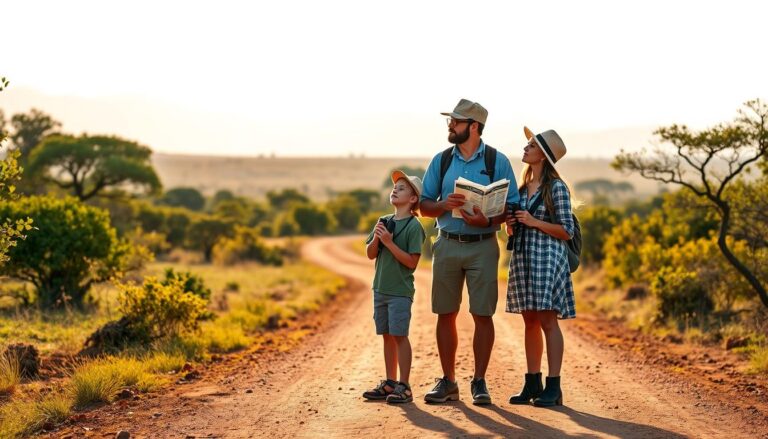Why Travel Insurance is Essential for an African Safari
Are you ready for the unexpected on your dream African safari? Exploring the savannas and forests is thrilling. But, it’s important to think about the risks.
Traveling without travel insurance can lead to big financial problems. Medical emergencies, trip cancellations, or lost luggage can be very expensive.
With the right travel insurance policy, you can protect your investment. This way, you can enjoy your safari adventure without worries. We’ll look at why travel insurance is key, the risks, and how to pick the best policy.
Understanding the Risks of Safari in Africa
Going on a wildlife safari in Africa is exciting, but it’s important to know the risks. African safaris are thrilling, but they can affect your health, safety, and overall experience.
Common Health Risks in African Safari Destinations
Traveling to African safari spots means facing health risks. Some big concerns are:
- Malaria and other mosquito-borne illnesses
- Waterborne diseases
- Heatstroke and dehydration
Knowing these risks helps you take steps to stay safe. This includes getting the right vaccinations and taking medications.
Safety Concerns During Wildlife Encounters
Wildlife encounters are a big part of any safari. But, they also come with safety risks. When you’re at safari lodges or exploring the wild, it’s key to listen to your guides. They know how to keep you safe.

Environmental Challenges in Remote Safari Locations
Remote safari spots face environmental challenges. These include limited medical help, harsh weather, and natural dangers. Being ready for these challenges is vital for a safe and fun safari.
Some important things to consider are:
- Packing the right gear for extreme weather
- Staying hydrated and managing heat
- Following safety rules given by your safari guides
The Financial Protection Travel Insurance Provides
Your African safari is a big financial step. Luxury safaris and tour costs can add up fast. Travel insurance helps protect your money from trip cancellations, interruptions, or lost deposits.

Cost Analysis: Safari Investments vs. Insurance Premiums
When planning a luxury safari, think about the tour cost versus insurance. Many operators offer insurance with their packages. This gives you full coverage. By comparing these costs, you see the value of protection against unexpected events.
| Luxury Safari Component | Average Cost | Insurance Coverage |
|---|---|---|
| Safari Tour Package | $5,000 – $10,000 | Trip Cancellation |
| Accommodation | $2,000 – $5,000 | Trip Interruption |
| Activities | $1,000 – $2,000 | Lost Deposits |
Coverage for Trip Cancellations and Interruptions
Trips can be cancelled or interrupted, leading to big financial losses. Insurance can cover these costs if something unexpected happens. Knowing what your insurance covers can give you peace of mind when booking.
Protection Against Lost Deposits and Prepayments
Lost deposits and prepayments can be a big financial hit. Insurance can help by reimbursing you if your tour operator goes bankrupt or if you need to cancel. This is key for luxury safaris where deposits are high.
Medical Coverage Essentials for Safari Adventures
Medical emergencies can happen without warning on a safari. It’s key to have good coverage. You’ll face both excitement and health risks in the wild. The right medical coverage can prevent big financial problems.
Emergency Medical Treatment in Remote Areas
Remote safari spots often don’t have good medical care nearby. If you need urgent care, finding it can be hard. Your insurance should cover emergency visits and treatments.
Medical Evacuation Coverage and Its Importance
At times, you might need to be flown to a better hospital. This can be very expensive. Medical evacuation services include helicopter rescues and air ambulances. Make sure your policy covers this to avoid huge costs.
Pre-existing Condition Considerations for Safari Travelers
If you have ongoing health issues, pick a policy that covers them. Some policies offer this if you buy them soon or meet certain health standards. Always tell your insurance about any health conditions before your trip. This way, you’re covered if you need medical help during your safari.
Knowing about these medical coverage basics helps you prepare for your safari. It ensures you’re ready for any medical costs that might come up.
Planning Your Safari in Africa with Insurance in Mind
When planning your African safari, it’s key to think about insurance. Different safaris, like walking or luxury ones, need different insurance. Knowing what you need is vital for good coverage.
Insurance Needs for Different Safari Types
Each safari type has its own risks. For example, walking safaris might need extra for hiking injuries. Luxury safaris might need coverage for expensive gear or places to stay.
Coverage for Various Safari Tour Packages
Safari packages vary a lot, from cheap to very expensive. It’s important to pick insurance that fits your package. This should cover things like trip cancellations or delays.
| Safari Type | Insurance Needs | Recommended Coverage |
|---|---|---|
| Walking Safari | Injury coverage, emergency medical evacuation | Adventure sports coverage |
| Luxury Safari | High-value equipment, luxury accommodations | High-end travel insurance |
| Wildlife Safari | Coverage for wildlife encounters, emergency medical treatment | Specialized wildlife safari insurance |
Special Considerations for Wildlife Safari Activities
Wildlife safaris include things like game drives or walking tours. These might need special insurance. Make sure your policy covers these and offers good protection in emergencies.
By planning your safari with insurance in mind, you can enjoy it more. You’ll know you’re safe from unexpected things.
How to Choose the Right Travel Insurance for Your African Safari
Choosing the right travel insurance for your African safari is important. Many insurance providers offer safari insurance policies. You need to think about the safari activities you’ll do and how much coverage you need.
Step1: Assess Your Specific Safari Activities and Risks
First, think about the activities you’ll do on your safari, like game drives or hiking. Each activity has its own risks. Make sure your insurance covers these risks.
If you’re staying at safari lodges, check if your policy covers high-value accommodations.
Step2: Compare Coverage Options and Limits
After figuring out your needs, compare different insurance policies. Look for ones that cover safari tour packages. Make sure they protect against trip cancellations, interruptions, and delays.
Step3: Review Policy Exclusions Carefully
It’s important to check what your policy doesn’t cover. Some policies might not cover certain activities or have restrictions on where you can go. Knowing what’s not covered is as important as knowing what is.
Step4: Evaluate Customer Service and Claims Process
Lastly, look at the customer service and claims process of the insurance provider. You want to be able to file a claim easily and get help quickly. Choose insurers known for good customer service and easy claims processes.
By following these steps, you can find a travel insurance policy that protects you well. This way, you can enjoy your African safari without worry.
Safari-Specific Insurance Features to Look For
Planning your African safari means choosing the right travel insurance. It should cover the special risks of this adventure. Your policy should fit the activities and places you’ll see on your trip.
Adventure Activity Coverage for Safari Experiences
Many policies cover adventure activities, which is key for safaris. This includes game drives and walking safaris. Make sure your policy includes these to protect you from accidents or injuries.
Protection for Safari Lodges and Accommodations
Your insurance should also protect your lodgings, like safari lodges. It should cover trip interruptions or cancellations due to issues with your lodgings.
Off-Road and Remote Location Coverage
Safaris often happen in remote, off-road places. Your insurance should cover you there, including medical evacuations if needed. Some policies might not cover off-road or remote areas, so check the details carefully.
- Coverage for adventure activities like game drives and walking safaris
- Protection for your safari lodge and other accommodations
- Insurance that applies to off-road and remote locations
By focusing on these safari-specific insurance features, you can enjoy your African safari with peace of mind. You’ll know you’re protected against the unique risks of this adventure.
Common Travel Insurance Exclusions for Safari Trips
Knowing what your travel insurance doesn’t cover is key for a worry-free safari. Travel insurance aims to protect you from many risks. But, some things it doesn’t cover can leave you at risk.
High-Risk Activities Often Not Covered
Many policies don’t cover high-risk activities like extreme sports or dangerous wildlife encounters. If you’re planning to do things like bungee jumping or white-water rafting, check if your policy covers it.
Geographical Restrictions and Political Instability Zones
Travel insurance often has geographical restrictions. It excludes areas seen as unsafe because of political instability or conflict. Make sure your destination is in the covered area.
Alcohol and Drug-Related Incidents
Alcohol or drug-related incidents are usually not covered. Taking risks while under the influence can make your insurance claims invalid. This could leave you with big financial problems.
Knowing these exclusions helps you choose the right travel insurance. This way, you can have a safer and more fun safari trip.
Real-Life Scenarios: When Travel Insurance Saved Safari Vacations
Your dream safari can quickly turn into a nightmare without the right travel insurance coverage. Many travelers have faced unexpected challenges on their African safari adventures. But, with the right insurance, they were able to handle these issues easily.
Case Study: Medical Emergency in the Serengeti
Imagine being on a thrilling game drive in the Serengeti when you suddenly fall ill or get injured. This happened to one traveler who suffered a severe medical emergency while on safari. Thanks to her travel insurance, she got immediate medical attention and was flown to a nearby hospital for further treatment.
Case Study: Lost Luggage with Safari Equipment
Another traveler had his luggage lost during transit to the safari lodge. His safari vacation deals included specialized equipment for a photography safari, which was in his lost luggage. Luckily, his travel insurance covered the loss, and he was able to replace the essential equipment in time for his safari activities.
Case Study: Trip Cancellation Due to Political Unrest
A family planning a safari vacation had to cancel their trip due to trip cancellation policies in place because of political unrest in the destination country. Their travel insurance reimbursed them for the non-refundable costs, saving them from significant financial loss.
| Scenario | Challenge | Insurance Benefit |
|---|---|---|
| Medical Emergency | Severe illness or injury during safari | Medical evacuation and treatment |
| Lost Luggage | Loss of safari equipment | Replacement of essential equipment |
| Trip Cancellation | Political unrest or unforeseen events | Reimbursement for non-refundable costs |
These real-life scenarios show how important it is to have good travel insurance for your safari adventure. Whether it’s a medical emergency, lost luggage, or trip cancellation, the right insurance can save your vacation and your money.
Top Insurance Providers for the Best Safaris in Africa
Planning the best safaris in Africa? Picking a good insurance provider is vital. It keeps your journey safe. There are many choices, so knowing what each offers is important.
Specialized Safari Insurance Companies
Some firms focus on safari insurance. They know the risks of African safaris well. Allianz Partners and World Nomads are top picks. They have plans that cover adventure activities and emergency medical evacuations.
General Travel Insurers with Strong Safari Coverage
Companies like Travelex and AXA also have great safari coverage. They offer plans that can be adjusted to meet your safari needs.
Cost Comparison and Value Analysis
Cost is a big deal when picking insurance. Here’s a quick comparison:
| Insurance Provider | Basic Premium | Comprehensive Premium | Key Features |
|---|---|---|---|
| Allianz Partners | $50 | $150 | Adventure sports coverage, medical evacuation |
| World Nomads | $60 | $180 | Flexible coverage, 24/7 assistance |
| Travelex | $40 | $120 | Trip cancellation, baggage loss |
By looking at these options, you can pick the best insurance for your African safari. This ensures a safe and unforgettable trip.
When to Purchase Travel Insurance for Your Safari Adventure
When you’re planning your safari adventure, think about when to buy travel insurance. Getting it early can give you more coverage and protect you from risks before you leave.
Optimal Timing for Best Coverage Options
Buy travel insurance right after you book your safari for the best coverage. This way, you’re safe from trip cancellations or changes due to unexpected events before you go.
Last-Minute Insurance Considerations
Even if you book your safari at the last minute, get insurance as soon as you can. Many providers cover unexpected events that might happen during your trip.
Seasonal Factors Affecting Insurance Needs
Seasonal factors like weather or political issues can change your safari plans. Knowing these can help you pick the right insurance for your trip.
How to File a Claim During or After Your Safari Vacation
If something unexpected happens on your safari, knowing how to file a claim is key. It makes the experience less stressful. There are a few important steps to follow to handle the situation well.
Step1: Document Everything
It’s vital to document everything when filing a claim. Collect all important documents like receipts and medical reports. Detailed documentation is essential for a smooth process.
Step2: Contact Your Insurance Provider Immediately
After documenting the incident, contact your insurance provider right away. They will help you with the first steps of the claims process. They’ll also tell you what you need to do next.
Step3: Submit Required Documentation
After talking to your insurer, you’ll need to send in the necessary documents. This might include a claims form or witness statements. Make sure to follow their instructions closely to avoid any delays.
| Claim Process Step | Description | Timeline |
|---|---|---|
| Document Everything | Gather all relevant documents related to the incident. | Immediately after the incident |
| Contact Insurance Provider | Notify your insurer about the incident and get guidance. | As soon as possible |
| Submit Documentation | Provide all required documents to support your claim. | Within the timeframe specified by your insurer |
By following these steps and keeping your documentation clear, you can make the claims process easier during or after your safari vacation.
Conclusion: Peace of Mind for Your Safari Adventure
Planning a safari in Africa? Travel insurance is key for a worry-free trip. It offers financial and medical protection, letting you dive into the adventure fully.
Knowing the risks, like health issues and wildlife dangers, helps you pick the right insurance. Choose a policy that covers your safari activities and medical evacuations. This way, you can explore safely.
Travel insurance means you’re ready for anything on your safari. Whether on a tour or solo, it lets you enjoy Africa’s wonders without stress.
So, as you start your African safari, remember to get travel insurance. Enjoy your journey with confidence and peace of mind.


